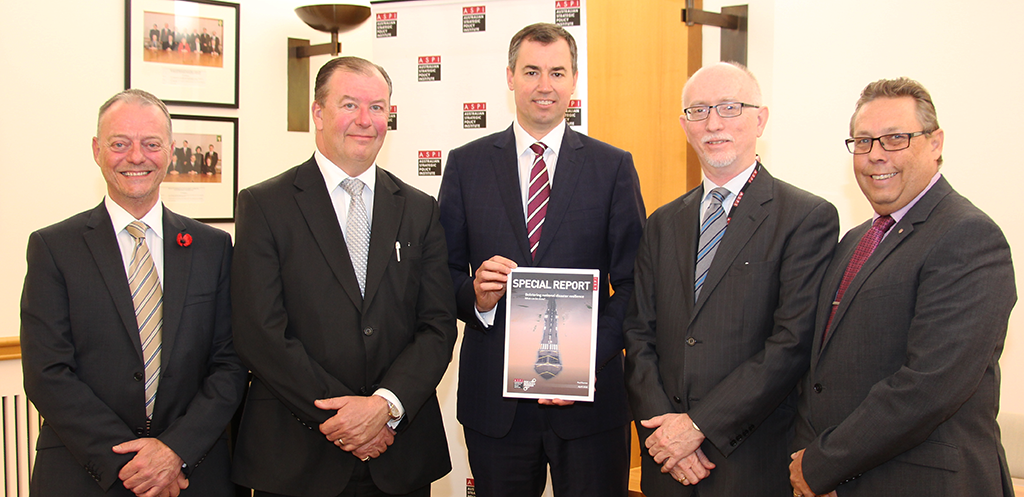ASPI launches its Risk & Resilience program
Posted By
Anthony Bergin
on April 28, 2016 @ 11:17

The aftershocks are now continuing to rattle the survivors of a series of deadly Japanese earthquakes with the death toll now at 48.
Natural disasters are predictive surprises: we don’t know when they’ll occur, but we know that they’ll happen, so planning and preparation can and does need to be done in advance. Scientific advances have enabled experts to better understand natural disasters and their effects. But too often basic lessons get re-learnt, with the same mistakes being made.
When it comes to natural disasters, no place in Australia is completely safe. But whether a particular community succumbs to such a natural disaster will depend on its resiliency and preparedness.
On 18 April I was privileged to host the launch of ASPI’s Risk and Resilience program, along with a paper by program head Paul Barnes, titled ‘Bolstering National Resilience: What can be done?’ The Risk and Resilience program is generously supported by Emergency Management Australia.
The program was launched at Parliament House by the Minister for Justice, Michael Keenan MP, who has federal responsibility for emergency management. I was pleased to hear the Minister open his remarks by pointing out that ‘ASPI does a wonderful job and they’re always worthwhile listening to and since I’ve arrived in this portfolio they’ve been a very valuable source of advice to me in a number of areas … from, I think, a very common sense and sensible place’.
The Minister pointed out that ‘natural disasters are a part of the landscape of Australia and that [they] are going to continue… the chances of Australians being caught in a natural disaster is actually going to increase over time...’ The Minister noted that our emergency management system is ‘very heavily weighted to how we clean up’.
But he also suggested that what we can do significantly better is to think harder about ‘what we could have done more to provide resilience to that community’. He asked, ‘Could we have built our buildings in a better way? Could we have provided better advice to people so they know with confidence what they should do in the event of a natural disaster?’
The Minister stressed the importance of mitigation: ‘The government needs to demonstrate that it is both working on prevention, that it is working before Australia is subject to a fire, cyclone, weather-related disaster. We need to answer the question of how we are protecting ourselves in advance… how can we provide resilience to affected communities before natural disasters strike?’
The Director-General of Emergency Management Australia, Mark Crosweller was also at the launch of the program. In his remarks, Mark noted the inevitability of disasters, the need to connect and communicate with communities and the need to change the language used to describe risk and resilience to better engage with local communities.
Mark warned though we need to start to prep for the ‘Big One’; while the most consequential events are the least likely, we don’t spend enough time focused on the consequences. Very few policymakers have actually lived through a catastrophic event and had to deal with one on a mass scale. We need to be able to ‘imagine before and act when the time comes’, he said.
Under our federal system, emergency management is primarily a matter for the states and territories. So it was also important to hear the views of Tony Pierce, the Inspector-General of Emergency Management from Victoria and Ian Mackenzie, the IGEM in Queensland. Their roles are independent of the emergency services, whose capability and capacity they ‘inspect’.
Tony noted that there’s now a risk of treating resilience as a ‘buzz’ issue, but resilience needs to stay as an issue on the table: an ongoing conversation about community resilience is needed. Tony noted the Christmas Day Wye River fire in Victoria as an example where a community understood what was going on and acted on response plans they themselves developed.
Ian Mackenzie said that ‘if we asked 10 people to define resilience we would probably get 11 different definitions’. He made the important point that interoperability in the emergency services industry isn’t just about radio channels, but more about culture: about ‘playing nice with each other and learning the differences in cultures and approaches’.
I noted three big takeaways from the discussions at the launch of ASPI’s Risk and Resilience program.
First, prevention is important (but so too is well coordinated recovery.) Right now we have disincentives for seeking resilience; we need to do more to create incentives for preparation. The insurance industry can play a key role here.
Second, was a recognition that while there may be lots of unknowns about how communities will handle disasters, response is local: we should be doing more to identify those who may need help and getting to know them in case of emergency.
Third, one of the most important imperatives for the next government will be to make Australia a more resilient nation.
ASPI’s Risk and Resilience program will promote inclusive dialogue on ensuring readiness for complex emergencies through better planning and preparation, and considering capability needs for future emergency events.
To do this the program will engage with practitioner and industry groups, including the emergency services and the ADF, for practical discussions aimed at improving disaster resilience.
Anthony Bergin is deputy director at ASPI.
Article printed from The Strategist: https://www.aspistrategist.org.au
URL to article: https://www.aspistrategist.org.au/aspi-launches-its-risk-resilience-program/
[1] series of deadly Japanese earthquakes: http://www.reuters.com/article/us-japan-quake-idUSKCN0XH0D5
[2] Risk and Resilience program: https://www.aspi.org.au/programs/resilience-program
[3] Bolstering National Resilience: What can be done?: https://www.aspi.org.au/publications/bolstering-national-disaster-resilience-what-can-be-done
[4] insurance industry can play a key role here: http://www.aspistrategist.org.au/building-back-better/
 Print This Post
Print This Post